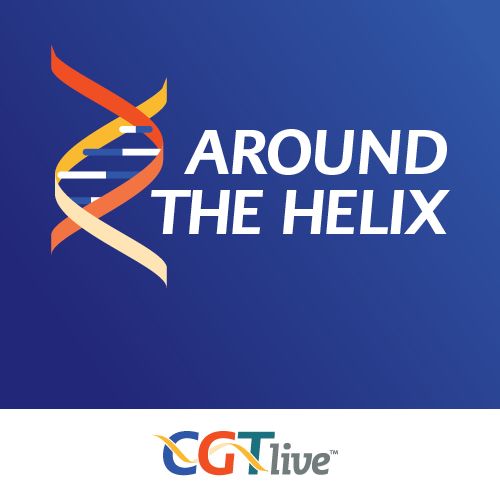Around the Helix: Cell and Gene Therapy Company Updates – January 8, 2025
Catch up on the latest news, breakthroughs, and announcements from biotechnology companies making advancements in cell and gene therapies.

The cell and gene therapy sectors are growing exponentially, with new players emerging daily and much progress being made both in and out of the lab. CGTLive®’s Around the Helix is your chance to catch up with the latest news in cell and gene therapies, including partnerships, pipeline updates, and more.
Have a cell and gene therapy news update you’d like to share with our editorial team? Tag us on social (@CGT_Live on X, or CGTLive on LinkedIn) and use #AroundTheHelix!
1. Capricor Puts Rolling BLA for DMD Cardiomyopathy Cell Therapy Deramiocel in Front of the FDA
Capricor Therapeutics has completed submission of a rolling biologics license application (BLA) for Deramiocel (also known as CAP-1002), an investigational allogeneic cardiosphere-derived cell therapy intended to treat Duchenne muscular dystrophy (DMD) cardiomyopathy, to the FDA.
2. Arbor Biotechnologies’ CRISPR-Based Gene Editing Therapy ABO-101 Cleared for US Trial in Primary Hyperoxaluria Type 1
Arbor Biotechnologies’ ABO-101, a lipid nanoparticle (LNP)-delivered CRISPR-based gene editing therapy, has received clearance from the FDA for an investigational new drug (IND) application, enabling a phase 1/2 study in primary hyperoxaluria type 1 (PH1).
3. Ultragenyx Puts BLA for MPSIII Gene Therapy UX111 in Front of FDA
Ultragenyx has submitted a biologics license application (BLA) to the FDA for UX111 (ABO-102), its adeno-associated virus (AAV) vector-based gene therapy intended to treat mucopolysaccharidosis type IIIA (MPS IIIA, also known as Sanfilippo syndrome).
4. RESTEM’s ULSC Therapy Restem-L Fast Tracked by FDA for Idiopathic Inflammatory Myopathy
RESTEM’s Restem-L, an investigational umbilical cord outer lining stem cells (ULSCs) product, has been granted fast track designation by the FDA for idiopathic inflammatory myopathy (IIM, also known as polymyositis and dermatomyositis, PM/DM).
5. ViGeneron Snags FDA Rare Pediatric Disease Designation for CNGA1-Associated Retinitis Pigmentosa Gene Therapy
VG901, which is currently being evaluated in a phase 1b clinical trial, is intended to deliver a copy of the CNGA-1 gene via a proprietary AAV vector referred to as vgAAV. In addition to the new designation, ViGeneron also announced that the data safety monitoring board for the trial has given the green light for dose escalation.
6. uniQure Public Offering Pricing Shares at $17
uniQure has announced that its public offering of 4,411,764 ordinary shares will price each share at $17.00, which the company expects will lead to an aggregate gross proceeds of $75 million before relevant deductions are made. UniQure owns a hemophilia B gene therapy product along with its partner CSL Behring, etranacogene dezaparvovec (marketed as Hemgenix), which was approved by the FDA in November 2022. UniQure is also developing gene therapy products for other diseases including Huntington disease and amyotrophic lateral sclerosis.
7. First Patient Dosed in EsoBiotec's Trial for In Vivo CAR-T ESO-T01
The first patient has been dosed in an early phase 1 investigator-initiated clinical trial (NCT06691685) taking place in China for EsoBiotec's ESO-T01, an investigational BCMA-directed in vivo chimeric antigen receptor T-cell (CAR-T) therapy being evaluated for the treatment of multiple myeloma. “Initial clinical observations with ESO-T01 indicate a favorable safety profile and promising efficacy already at the first dose level of 0.25x109 transducing unit per patient, with pharmacokinetic characteristics comparable to autologous ex vivo CAR-T therapies,” principal investigator Heng MEI, PhD, MD, a professor at Union Hospital, Tongji Medical College, Huazhong University of Science and Technology, said in a statement.
8. Tessera Garners Investment Worth up to $50 Million for SCD Gene Therapy Development
Tessera Therapeutics has received an initial investment from the Bill & Melinda Gates Foundation and may receive additional investments from the foundation later on that could total up to $50 million. The investments will support Tessera's in vivo gene therapy program for sickle cell disease (SCD) based on the company's nonviral delivery platform. “SCD patients globally remain deeply underserved by existing treatment options," Michael Severino, MD, the CEO of Tessera Therapeutics, said in a statement. "We are excited to develop what we believe will be a disruptive one-time curative treatment for SCD that is safer, easier, and more scalable than ex vivo genetic approaches."
Newsletter
Stay at the forefront of cutting-edge science with CGT—your direct line to expert insights, breakthrough data, and real-time coverage of the latest advancements in cell and gene therapy.